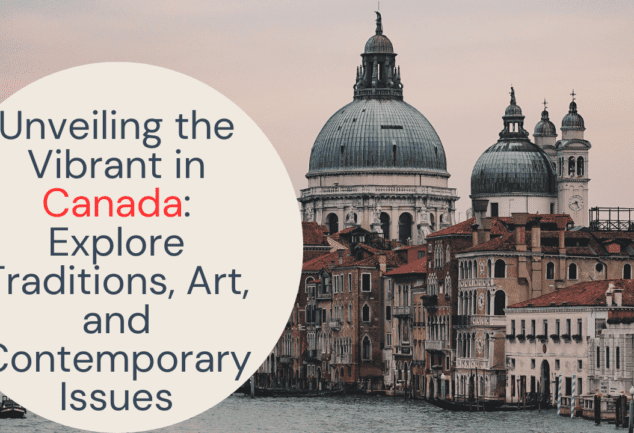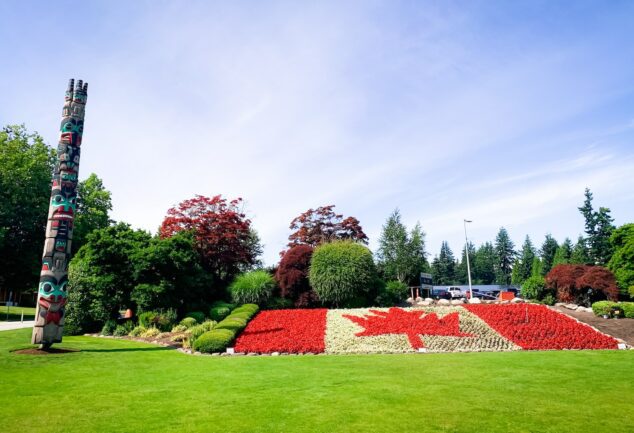Canada is a diverse and multicultural country, known for its acceptance and celebration of various religions and cultures.
With such a rich tapestry of traditions, practices, and beliefs, it can be overwhelming to understand the role of religion and culture in Canadian society.
Whether you are a resident or a visitor, having a comprehensive guide to navigate this aspect of Canadian life can be invaluable.


Canada prides itself on being a mosaic of cultures, with over 200 ethnic origins reported by its citizens.
Religion plays a significant role in shaping the cultural fabric of the country, with Christianity being the largest religious affiliation followed by Islam, Hinduism, Sikhism, Buddhism, and Judaism, among others.
Understanding the nuances of how religion and culture intersect in Canada is essential for fostering inclusivity and promoting mutual understanding.
In this comprehensive guide, we will explore the diverse religious and cultural landscape of Canada, providing insights into the major religions practiced, their historical roots, significant festivals and holidays, as well as the impact of religion on various aspects of Canadian life.
Whether you are interested in exploring places of worship, understanding religious customs, or simply gaining a deeper appreciation for the cultural diversity that Canada offers, this guide will serve as your go-to resource.
So, let us delve into the tapestry of religion and culture in Canada and discover the richness it brings to the Canadian identity.
Overview of Religion & Culture in Canada
Religion and culture in Canada are subjects that span centuries of historical, societal, and political developments. Canada’s religious landscape is as diverse as its population, with a rich history of religious practices and traditions.
From the Aboriginal peoples’ spiritual beliefs to the various Christian churches, Canada’s religious communities have played a significant role in shaping its cultural identity. Over time, the country has witnessed an increase in religious diversity due to immigration waves from different parts of the world.
Today, religious belief is considered a private matter, and the Canadian government has adopted a secular stance, promoting religious freedom and pluralism. This overview will delve into the history, statistics, and cultural practices of religion in Canada.
Objective of the Guide
The objective of this guide is to provide readers with a comprehensive overview of Religion & Culture in Canada. By exploring the history, beliefs, practices, and diversity of religion and culture in Canada,
this guide aims to inform and educate readers about the rich tapestry that shapes the Canadian society.
Throughout this guide, readers will gain insight into the various religious traditions, customs, and values that have played a significant role in shaping Canada’s cultural landscape. From the Indigenous spiritual beliefs and practices to the diverse religious communities that have settled in Canada,
this guide aims to highlight the range of religious experiences and expressions present in the country.
By offering a detailed exploration of the historical context, religious beliefs, and cultural practices, this guide seeks to provide readers with a deeper understanding of the complex relationship between religion and culture in Canada.
Whether it is exploring the impact of Christianity in the 19th and 20th centuries, understanding the cultural traditions in Quebec City, or examining the religious diversity in Canadian cities, this guide aims to enhance readers’ knowledge of the religious and cultural fabric that makes up Canada.
History of Religion & Culture in Canada
The history of religion and culture in Canada is a rich tapestry woven together by the diverse beliefs, practices, and traditions of its people. From the early spiritual beliefs of the Indigenous peoples to the arrival of various religious communities in the country, Canada has been shaped by a wide range of religious and cultural influences.
This guide explores the religious landscape of Canada, examining the customs, traditions, and values that have helped to define the nation’s identity. We will delve into the historical context, notable events, and the changing dynamics of religious and cultural practices in Canada, presenting a comprehensive overview of this fascinating aspect of Canada’s heritage.

A Comprehensive Guide to Language and Culture in Canada

A Comprehensive Guide to Surrey Immigration
19th Century Religion & Culture in Canada
During the 19th century, religion played a pivotal role in shaping the cultural fabric of Canada. Christianity, particularly Protestantism, wielded a significant influence over the religious beliefs and customs of Canadians during this era.
Missionaries from various Christian denominations, such as the Anglican Church of Canada and the Roman Catholic Church, actively worked to propagate their faith among indigenous peoples, settlers, and immigrants. The establishment of religious communities and institutions, including churches, schools, and hospitals, further cemented Christianity’s presence in Canadian society.
Important religious ceremonies like baptism, confirmation, and marriage were widely practiced, fostering a sense of identity and community.
While Christianity was the dominant religious force in 19th century Canada, other religious communities, such as Jewish, Muslim, and various Eastern traditions, also began to emerge during this period.
Nevertheless, these communities were relatively smaller in size compared to the Christian population. Despite the existence of religious diversity, Christianity continued to hold sway not only over individual practices but also over societal norms and values.
The 19th century laid the groundwork for Canada’s religious and cultural landscape, setting the stage for the development of a multicultural and pluralistic society in the years to follow.
20th Century Religion & Culture in Canada
The 20th century witnessed significant developments and influences on religion and culture in Canada. One key aspect was the acceptance of religious garb in Canadian society. As the country became more diverse, individuals from various religious backgrounds were able to freely express their faith through their clothing and other practices.
Additionally, this period saw the enactment of laws regarding religious dress in public. These laws aimed to protect individuals’ rights to religious expression and promote religious tolerance and understanding.
Another notable trend during the 20th century was the declining share of Canadians identifying as Christians. As the country became more secularized and diverse, the influence of traditional Christian denominations waned. This shift in religious demographics contributed to the growing religious diversity in Canada.
New religious traditions emerged, and different faith communities began to flourish. Alongside this, the role of religion in public life also underwent changes. While religion used to play a prominent role in shaping Canadian society and its policies, it became more of a private matter as the 20th century progressed.
Overall, the 20th century marks a significant period of transformation in religion and culture in Canada, characterized by the acceptance of religious diversity and the evolving role of religion in public life.
Religious Beliefs and Practices in Canada
Religion has been a diverse and intricate part of Canada’s culture and history since the 16th century. Its impact on Canadian society has been significant, with a wide array of religious beliefs and practices observed by individuals from various backgrounds who now call Canada their home.
Christianity, comprising the Anglican Church of Canada, Roman Catholicism, and various Protestant denominations, stands as the most prevalent religion in the country, as per statistics from the Government of Canada. However, Canada also embraces a growing number of adherents to non-Christian religions, including Islam, Hinduism, Sikhism, Buddhism, and others.
Religious practices in Canada encompass a broad spectrum, with Canadians participating in diverse religious rituals, ceremonies, and observances. The Canadian state maintains a stance of neutrality regarding religion, respecting it as a private matter and safeguarding the freedom of religious belief and expression.
This respect for religious diversity is a central element of Canadian culture and has contributed significantly to the country’s reputation as a hospitable and inclusive society.


Statistics Canada’s Findings on Religion and Beliefs in Canada
According to Statistics Canada, there has been a significant shift in religious beliefs among Canadians in recent years. The data shows a declining share of Christians, with an increasing number of Canadians identifying as having no religion.
This shift can be attributed to a variety of factors, including changing societal attitudes, secularization, and an increasing immigrant population with diverse religious backgrounds. The rise of Canadians with no religion reflects a growing trend towards secularism and the privatization of religious beliefs in Canadian society.
Furthermore, Statistics Canada’s findings also highlight the increasing identification with other faiths due to immigration. As Canada continues to attract immigrants from around the world, there has been a diversification of religious beliefs and practices within the country.
This has resulted in a more diverse religious landscape, with a significant increase in the number of individuals identifying with religions such as Islam, Hinduism, Sikhism, and Buddhism.
Immigration plays a crucial role in shaping the religious fabric of Canada, contributing to the overall religious diversity and cultural richness of the country.
Canadian Cultural Traditions Related to Religion and Faith
Canadian cultural traditions related to religion and faith are diverse and have played a significant role in shaping Canadian society. One such tradition is the celebration of Christmas and Easter as national holidays.
These holidays hold great importance for Christians, and their celebration has become a part of Canadian culture, observed by both religious and non-religious individuals alike. It is a time for family gatherings, gift-giving, and spreading love and joy.
Another significant aspect of Canadian religious and cultural traditions is the battle for acceptance of religious garb in Canadian society. Over the years, there have been debates and discussions about allowing individuals to express their religious beliefs through their clothing choices.
This issue particularly gained attention when discussions arose about banning religious symbols in certain public sectors. These debates reflect the ongoing struggle to balance individual freedoms and values with the principles of secularism and inclusivity.
Incorporation of aboriginal spirituality with Christianity is another important aspect of Canadian cultural traditions related to religion and faith. Many indigenous communities have blended their ancestral spiritual practices with Christian beliefs brought by European settlers.
The integration of these two belief systems reflects the resilience of indigenous cultures and their ability to adapt while maintaining their unique traditions and identities.
Overall, Canadian cultural traditions related to religion and faith encompass various practices, from the celebration of national holidays to debates about religious garb and the incorporation of indigenous spirituality into Christian practices.
These traditions show the richness and diversity of religious beliefs and the ongoing dialogue about the role of religion in Canadian society.
Religious Communities and Diversity in Canada
Religious communities and diversity in Canada have played a significant role in shaping the country’s cultural landscape throughout its history. With a history that spans centuries and a population characterized by ethnic diversity, Canadian society is home to a wide range of religious beliefs and practices.
According to Statistics Canada’s National Household Survey, Christianity remains the most prominent religion in Canada, with the Anglican Church of Canada and the Roman Catholic Church being the largest Christian denominations. However, Canada is also home to a diverse collection of other religious traditions, including Islam, Hinduism, Sikhism, Judaism, and Buddhism, among others.
This religious diversity is not limited to the major urban centers but can be found in communities across the country. The Canadian government recognizes and values the importance of religious freedom, and the nation’s commitment to multiculturalism serves to promote the acceptance and celebration of different religious beliefs and practices.
As a result, Canada has become a melting pot of diverse religious communities, where individuals are free to express and practice their faith in a welcoming and inclusive society.
Private Matters vs. Publicly Accepted Religious Practices in Canadian Society
In Canadian society, there is a clear distinction between private matters and publicly accepted religious practices. Canada, being a culturally diverse nation, recognizes the importance of individual autonomy and the right to practice one’s religion freely within the confines of one’s personal space.
Private matters, such as personal beliefs and spiritual practices, are generally respected and protected by the law. However, challenges may arise when these private beliefs clash with the values and norms of the wider society. Conflicts can emerge when religious practices become more visible in the public sphere, especially if they are seen as infringing upon the rights or comfort of others.
Balancing the rights of individuals to freely express their religious beliefs with the need for social harmony and respect is an ongoing challenge in Canadian society.
The Canadian government plays a crucial role in regulating and balancing religious practices in the public sphere. While Canada is committed to upholding the freedom of religion, it also has the responsibility to ensure that public displays of religious practices do not promote discrimination or harm to others.
The government sets laws and policies that aim to protect individuals’ rights to practice their religious beliefs without infringing on the rights of others. This includes areas such as employment, education, and public services, where accommodations may need to be made to allow individuals to adhere to their religious practices while still maintaining a fair and inclusive environment for all Canadians.
Recent legal cases and controversies related to religious freedom have had a significant impact on Canadian society. These cases often revolve around the tension between individual religious rights and the broader social values of equality, inclusivity, and non-discrimination.
For example, the Supreme Court of Canada has ruled on cases involving religious dress in public institutions and the right of religious communities to practice certain rituals that might be seen as controversial by others. These cases have sparked debates and discussions about the limits of religious freedom and the extent to which religious practices should be accommodated in the public sphere.
The outcomes of these cases have shaped the legal framework for religious freedom in Canada and continue to influence the ongoing dialogue and understanding of the relationship between private matters and publicly accepted religious practices in Canadian society.
Aboriginal Peoples’ Religious Beliefs and Practices in Canada
The religious beliefs and practices of Aboriginal peoples in Canada hold deep historical and cultural significance. Before the arrival of European settlers, Indigenous peoples had their own unique spiritual beliefs and traditions, deeply connected to the land and nature.
These beliefs were central to their cultural identity and played a vital role in their daily lives. Today, Aboriginal peoples in Canada continue to practice their traditional religious beliefs alongside other spiritual traditions.
It is important to understand and respect the diversity of religious beliefs and practices within the Indigenous communities, as it forms an integral part of their cultural heritage and contributes to the rich religious landscape of Canada.
Christian Churches Relevant to Aboriginal Peoples’ Faith Traditions
Christian churches in Canada have played a significant role in the spiritual life of Aboriginal peoples. Some of the Christian churches that are relevant to the faith traditions of Aboriginal peoples include the Anglican Church of Canada, the United Church of Canada, and the Roman Catholic Church.
These churches have been involved in missionary work among Indigenous communities for centuries, introducing Christianity to many Aboriginal individuals and communities. As a result, there are now a significant number of Indigenous Christians in Canada.
However, it’s important to note that not all Indigenous people have converted to Christianity. Many Indigenous individuals continue to hold onto their traditional spiritual beliefs alongside their Christian faith. This is a reflection of the rich and diverse religious landscape within Indigenous communities.
Some individuals have embraced a hybrid faith, which combines elements of Aboriginal spirituality with Christian teachings and practices. This hybrid faith allows Indigenous people to maintain a connection to their ancestral traditions while also being part of a Christian community.
This blending of traditions is an expression of the resilience and adaptability of Indigenous spiritual beliefs in the face of historical challenges and cultural assimilation.
Anglian Church of Canada: Its Influence on Canadian History, Government, and Society
Introduction:
The Anglican Church of Canada holds a significant place in the religious and cultural landscape of the country. With a history that dates back to the 18th century, the church has played a crucial role in shaping Canadian society, government, and history.
This paragraph will explore the influence of the Anglican Church of Canada on these aspects of Canadian life.
Influence on Canadian History:
The Anglican Church of Canada has deep roots in the country’s history, tracing its origins back to the arrival of British settlers in the early 19th century. As one of the main Christian denominations, the Anglican Church has been closely intertwined with the development of Canadian institutions and the colonization of indigenous lands.
Missionaries associated with the church played a role in spreading Christianity and British cultural norms among the indigenous communities, influencing their way of life and religious practices.
The church’s historical involvement in the residential school system, aimed at assimilating indigenous children, has had a lasting impact on Canadian history, with its legacy still being reckoned with today.
Influence on Canadian Government:
The Anglican Church of Canada has also had a significant influence on the country’s government. Historically, the connection between the church and the state was strong, with the Anglican Church often enjoying privileged status and influence.
Bishops were appointed as advisers to government officials, and the church had a say in matters of education and social welfare. However, as Canada evolved into a more secular society, the separation between church and state became stronger, diminishing the direct influence of religious institutions like the Anglican Church on the government.
Nonetheless, the church continues to have a presence in debates surrounding social justice and policy decisions.
Influence on Canadian Society:
The Anglican Church of Canada has had a profound impact on Canadian society and culture. The church’s traditions, rituals, and religious practices have become embedded in the fabric of the country.
From conducting baptisms, weddings, and funerals to providing pastoral care, the Anglican Church has been a key source of spiritual support for many Canadians.
Through its commitment to social justice, the church has advocated for greater inclusivity and has played a role in addressing issues such as poverty, reconciliation with indigenous peoples, and LGBTQ+ rights. The Anglican Church’s influence on Canadian society can be seen in its efforts to foster dialogue and understanding between different religious and cultural communities across the country.
In conclusion, the Anglican Church of Canada’s influence extends beyond religious practices and beliefs. Its impact on Canadian history, government, and society is deep-rooted and continues to shape the nation’s identity.
As Canada embraces its diverse cultural and religious heritage, the Anglican Church’s role evolves, bringing new perspectives and engaging with contemporary challenges.

Exploring Canadian National Identity: A Comprehensive Guide

The Complete Guide to Canada Visa Sponsorship
Christianity as a Major Factor Influencing Canadian Cultural Practices Today
Christianity continues to have a major influence on Canadian cultural practices today. From holidays to attitudes towards religion, the principles of secularism, and the coexistence of different faith traditions, Christianity has left a lasting impact on Canadian society.
One significant way in which Christianity has shaped Canadian culture is through holidays and celebrations. Christian holidays such as Christmas and Easter are widely observed and celebrated throughout the country, both by Christians and non-Christians alike.
These holidays have become an integral part of Canadian cultural traditions, with practices such as gift-giving, holiday decorations, and special meals being embraced by individuals and families across the country.
Christianity has also influenced and molded Canadian society’s attitudes towards religion. As a predominantly Christian nation, Christianity often plays a defining role in discussions about religious practices and beliefs.
The principles of secularism, which aim to separate religious authority from government institutions, have been influenced by the Christian belief in the separation of church and state. This has led to a diverse and inclusive approach towards different faith traditions, allowing them to coexist alongside Christianity in Canada.
As a result, religious diversity has become a hallmark of Canadian society, with individuals practicing a wide range of religions and belief systems.
In conclusion, Christianity continues to be a major factor influencing Canadian cultural practices today. From holidays to attitudes towards religion, Christianity has shaped Canadian society in numerous ways.
The principles of secularism, coupled with a commitment to religious diversity, have allowed Christianity to coexist alongside other faith traditions, fostering a rich and inclusive cultural landscape in Canada.
Paul Bramadat’s Research on Ethnic Diversity & Spiritual Beliefs in Canada
Paul Bramadat, a renowned scholar in the field of religious studies, has conducted extensive research on the intricate relationship between ethnic diversity and spiritual beliefs in Canada. His work sheds light on the dynamic cultural landscape of religion in the country.
Bramadat’s research focuses on understanding how various ethnic communities in Canada have adapted their religious traditions and practices to the multicultural context of the country.
He highlights how immigrants and their descendants have brought a wide range of spiritual beliefs, rituals, and traditions from their home countries, resulting in a vibrant tapestry of religious diversity in Canada.
One of the key findings of Bramadat’s research is that ethnic diversity significantly influences the expression and experience of spirituality in Canada. He argues that individuals often engage with their religious traditions in ways that reflect their unique cultural backgrounds, contributing to a rich and evolving religious tapestry.
Moreover, Bramadat’s research emphasizes the need to recognize and respect the complexity of religious identities in a multicultural society. His work challenges the notion of a singular Canadian religious identity and underscores the importance of pluralism and inclusivity.
Overall, Bramadat’s research has greatly enhanced our understanding of the cultural landscape of religion in Canada. It has provided valuable insights into how ethnic diversity shapes spiritual beliefs and practices, highlighting the importance of acknowledging and celebrating the diverse religious traditions that thrive within the country.
In conclusion, exploring the rich tapestry of religion and culture in Canada is a journey that will open your eyes, expand your perspective, and deepen your understanding of this diverse and inclusive country. From vibrant festivals to breathtaking places of worship, Canada offers a unique blend of traditions and beliefs that celebrate unity in diversity.
So, embrace the opportunity to learn, respect, and appreciate the multicultural mosaic that shapes the Canadian identity.
Let the beauty of religious and cultural diversity be a source of inspiration as we strive for a more harmonious and inclusive society.




